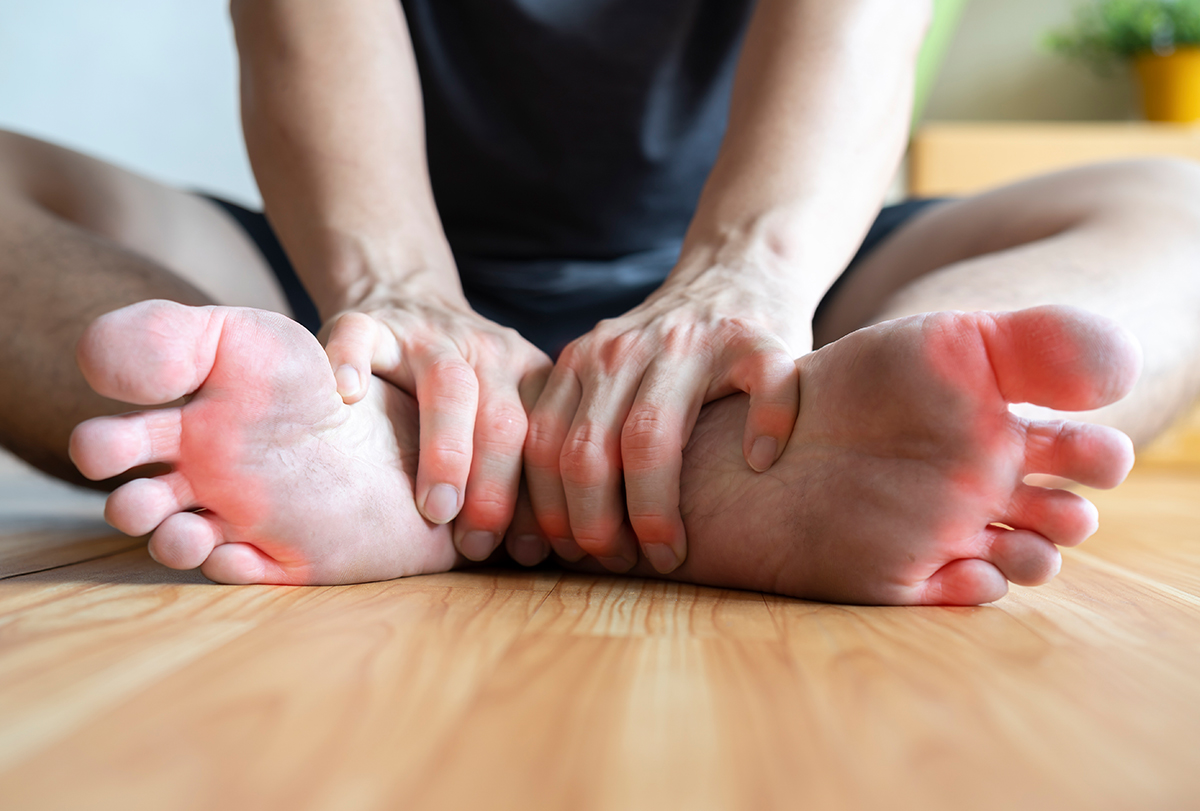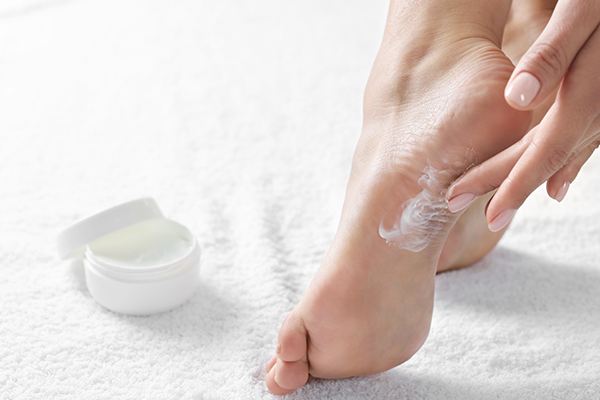In this article:
A burning sensation in the feet is a symptom rather than a condition in and of itself. It is fairly common, especially among older adults, and can be a source of great discomfort and distress for as long as it lasts.

The constant warm, tingly, and often painful feeling in your feet can keep you up at night. It requires attention if it becomes severe or chronic or is accompanied by other unusual symptoms.
This article will take you through the multiple causes and symptoms of burning feet syndrome and its medical treatment.
Cause of Burning Sensation in the Feet
Many different conditions or factors can trigger burning feet syndrome, but it is mainly associated with diabetes-induced peripheral neuropathy.
Poorly controlled diabetes causes poor blood circulation in the lower extremities, which damages the nerves in the areas over time, giving rise to this sensation. (1)(2)
Other common culprits behind burning feet syndrome are: (3)
- Poor diet, which leads to vitamin B deficiency or severe malnutrition (4)
- Alcohol abuse, which implies excessive consumption of alcohol on a regular basis that causes nerve damage over time (5)
- Advanced renal damage, which causes nerve damage, particularly noticed in dialysis patients (1)(2)
- Hormonal fluctuations (6) associated with menopause (7) and hypothyroidism (8)
- Genetic predisposition (2)
- Entrapment neuropathies, wherein the peripheral nerves that are responsible for carrying information between the brain and the rest of the body get compressed and cause tingling, numbness, and even burning in the affected area (usually the hands and feet) (3)
- Peripheral artery disease, which can cause poor blood circulation in the legs, resulting in burning feet syndrome
- Erythromelalgia, which is an uncommon condition that largely affects the lower extremities and is characterized by redness, warmth, and burning (9)
- HIV infection, which commonly causes neurological damage that triggers burning feet syndrome (10)
- Chemotherapy medication that is administered intravenously, wherein a small amount may sometimes seep out of the capillaries, especially those in the hands and feet, causing damage to the surrounding tissue and leading to burning, swelling, and redness (11)
- Athlete’s foot, which is a common fungal infection that affects the feet, wherein the infected skin may burn, itch, or tingle (12)
- Contact dermatitis, which is an inflammatory skin disorder that can cause burning in the feet (13)
- Wearing tight shoes or socks for long periods, which restricts blood flow in the feet
- Allergies, which trigger an inflammatory response inside the body and can make your skin burn, tingle, itch, swell up, and turn red
- Excessive strain on the feet due to intensive exercise, prolonged standing, or physical injury
Symptoms Associated With Burning Feet Syndrome
Sometimes your feet tend to feel unusually warm, prickly, and tingly, which may be accompanied by a sharp or stabbing pain, numbness, and skin redness. (2)
This “burning sensation in the feet” can occur as an isolated symptom or along with a variety of other systemic symptoms.
Treatment for Burning Feet

Since burning feet syndrome is usually symptomatic of some other ailment, it can only be cured by treating the root cause. Thus, the treatment approach may vary from patient to patient, depending on the underlying cause.
That said, here are some of the commonly used medications for this condition:
- Burning feet syndrome can make it difficult for you to get a good night’s sleep for as long as it lasts. This can hamper your cognitive function, mood, and energy levels. In such a case, the doctor may prescribe medications such as pregabalin, gabapentin, or antidepressants to help you deal with the constant psychological distress.
- Some patients also respond to the over-the-counter antioxidant alpha-lipoic acid. Some patients may benefit from the use of zinc. (2)
- Topical capsaicin cream is also routinely used for alleviating burning pain in the feet, although it may worsen it at first due to its heat-producing nature. The heat stimulates blood circulation in the area, which may help relieve your symptoms.
- Physical therapy is a must.
- Ayurvedic herbs such as atibalamula and bhumyamalaki have been proven useful in relieving burning feet syndrome caused by diabetic neuropathy. (14)
- If the burning sensation in your feet is the result of athlete’s foot, you will need antifungal medications to cure the underlying infection. Topical antifungals are generally available over the counter, but if they don’t work, consult your doctor for an oral prescription. Once the infection clears, your skin will heal and the burning sensation will go away.
Diagnosis of Burning Feet Syndrome

Burning sensation in the feet can be triggered by a variety of underlying conditions and is treated accordingly. Thus, you need a proper diagnosis to determine what exactly is causing this problem.
To that end, your doctor will first go through your medical history and symptoms to look for possible causes of peripheral neuropathy. If your symptoms are deteriorating rapidly, electromyography and/or nerve conduction tests may be conducted for quicker results.
Severe cases may warrant additional lab tests such as a serum glucose test, evaluation of vitamin B12 level, total blood count, erythrocyte sedimentation rate test, rapid plasma test, and serum electrophoresis. If the diagnosis is still inconclusive, your doctor may order a skin biopsy. (2)
Final Word
A burning sensation in the feet can cause a lot of physical discomfort, mental stress, and sleepless nights.
Before you can get around to treating it, you need to understand what is causing it. Unless the root cause is eliminated, the condition will keep on resurfacing.
Mild benign cases can be cured at home with OTC medication and home remedies, while severe or complex cases may require long-term treatment under the supervision of a doctor.

- Was this article helpful?
- YES, THANKS!NOT REALLY


